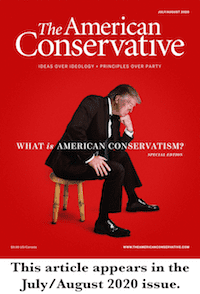Conservatism Recovers and Preserves for the Future

Michael Oakeshott rooted conservatism in a disposition of gratitude, wizened by an awareness of scarcity. As the times change, so does conservatism:
If the present is arid, offering little or nothing to be used or enjoyed, then this inclination will be weak or absent; if the present is remarkably unsettled, it will display itself in a search for a firmer foothold and consequently in a recourse to and an exploration of the past; but it asserts itself characteristically when there is much to be enjoyed, and it will be strongest when this is combined with evident risk of loss. In short, it is a disposition appropriate to a man who is acutely aware of having something to lose which he has learned to care for; a man in some degree rich in opportunities for enjoyment, but not so rich that he can afford to be indifferent to loss. It will appear more naturally in the old than in the young, not because the old are more sensitive to loss but because they are apt to be more fully aware of the resources of their world and therefore less likely to find them inadequate.
I grew up in a time where there was much to be enjoyed. And I believe we have entered one that is remarkably unsettled.
Do we even know who we are? Writing in the book that inspired this symposium, William F. Buckley sounded as if conservatives were an obscure minority in the movement named after them:
Conservatives, under the stress of our times, have had to invite all kinds of people into their ranks, to help with the job at hand, and the natural courtesy of the conservative causes him to treat such people not as janissaries, but as equals; and so, empirically, it becomes difficult to see behind the khaki, to know surely whether that is a conservative over there doing what needs to be done, or a radical, or merely a noisemaker, or pyrotechnician, since our rag-tag army sometimes moves together in surprising uniformity, and there are exhilarating moments when everyone’s eye is Right.
An unsettled time should unsettle our thought, allow us to question certain features of it that began their lives as present necessities, and then ossified into useless political dogmas, or self-soothing jargon. A conservative in these times should be driven back to his history. The temptation is to search our history for an overlooked but all-conquering principle that can be filched from one titan, turned into a quickie book, and then promptly flattened into a few white papers and slogans for the next Republican presidential campaign. It’s time to resist that temptation and turn to history in an attempt at anamnesis. A conservative studies history not to produce more “content” but to fortify his own character.
The re-emergence of nationalist politics and nationalist consciousness on the Right does not surprise me. Though some subset of people are inclined by their psychology to dwell on national sentiment, for the vast majority of people nationalist politics and moods are temporary. They come about when our deepest loyalties are disturbed in some way. Right now there are three challenges Americans face that have summoned this nationalistic response.
The first is the shrinking of America’s middle class and the hardening of American society into distinct social classes that have less to say or do with one another. The second is the sudden assertive intrusion of Chinese political power throughout the global system that America did the most to construct. And most of all, in my opinion, fertility rates that signal a forthcoming demographic contraction, and a society characterized more by loneliness and atomization.
The first challenges present a serious internal political problem of cohesion, one that can only be solved by revivifying our republican and democratic traditions, to balance the liberal ones. The second is a geopolitical threat that must be intelligently confronted, but should not inspire panic; China has graver problems than we do. The third is perhaps the most serious, because it is not reducible to a social problem about marriageable males, or of learning to perpetuate a society that has discovered effective birth control—as serious as those may be. At heart it is a spiritual crisis.
My own attempt to define the conservative outlook is an attempt to face up to that spiritual crisis. In this unsettled age,  conservatism is the work of recovering and restoring a home in this world—a place of consolation, a sanctified somewhere that connects us to the dead, the unborn, and our neighbors through love, memory, and sacrifice. This work can never be done perfectly, not only because we ourselves are fallible, but because this world is not our final home. We take up the work because we want to provide for our children. And our faults in this work become a burden for them. They in turn must repair and improve on what we did, at first appalled by our faults but, we hope, eventually inspired by our successes too. The sum of this process is a national tradition, falling into disrepair and then renewing itself across generations.
conservatism is the work of recovering and restoring a home in this world—a place of consolation, a sanctified somewhere that connects us to the dead, the unborn, and our neighbors through love, memory, and sacrifice. This work can never be done perfectly, not only because we ourselves are fallible, but because this world is not our final home. We take up the work because we want to provide for our children. And our faults in this work become a burden for them. They in turn must repair and improve on what we did, at first appalled by our faults but, we hope, eventually inspired by our successes too. The sum of this process is a national tradition, falling into disrepair and then renewing itself across generations.
This attempt at making a home—a place where no one is merely useful, and no one is merely familiar—implants in us a longing for the true home that can never be destroyed. We put in our labors to preserve freedom, decency, and our culture, so that our children receive this somewhere as a place prepared for them by their fathers.
Michael Brendan Dougherty is a senior writer at National Review Online, and the author of My Father Left Me Ireland.
Related: Introducing the TAC Symposium: What Is American Conservatism?
See all the articles published in the symposium, here.
Comments